Former Burundi President suggests that a unique monument be constructed to commemorate the death of all victims of crimes committed in Burundi. Discriminatory commemoration is the result of lack of dialogue, he says.
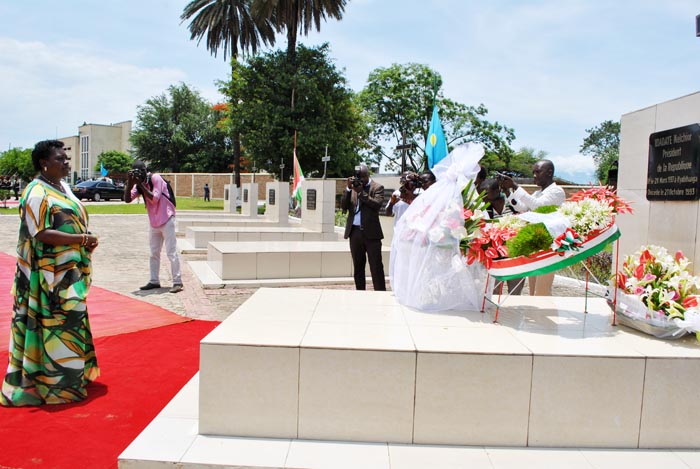
The grave of President Melchior Ndadaye and his aides
Since Burundi’s independence, the country has experienced mass killings, wars and cycles of violence. Survivors of the killings and family members of the victims organize ceremonies to commemorate the killings of theirs on the basis of their ethnic background. Places of commemoration of victims have been set up in various parts of the country. People who belong to Tutsi ethnic group commemorate the killings of their fellow victims of crimes committed by people from Hutu ethnic group and vice versa.
When Burundians commemorate the assassination of the first Hutu President, Melchior Ndadaye, on 21 October, a Tutsi-dominated group of people organizes ceremonies to commemorate Tutsi students killed in Kibimba, by their teachers from Hutu ethnic group. There are other places of commemoration of the victims including Mabayi, Itaba-Gitega, Rutegama, Bugendana, Buta, Muyinga, Buterere,etc.
Jean Nepo Bironkwa, a survivor of the massacres of the young seminarians of Buta in 1997, says the remembrance of his former classmates is an opportunity to relieve him. “It’s a therapy for us. We have to remember our brothers slaughtered horribly so that our souls should be healed, “he says.
“When I’m listening to people talking about the 1972 events, I feel very interested because I hope someone can mention my father’s name. My mother told me that my dad was killed in 1972 but does not want to talk to me about his death. I want to know about my father’ death, “says Josée Kantungeko, a mother of two. She says she never saw her father.
Jean Claude Nkundwa, an expert in peaceful conflict resolution, says these discriminatory commemorations of painful events are a depiction of the population’s unhealed wounds. Ethnic discrimination in the commemoration of the murder of the victims is a sign of lack of reconciliation. “There is a risk of plunging into the same tragic history again” says Nkundwa.
According to him, Burundians have got the opportunity to express their painful feelings, but haven’t so far got the occasion to get their wounds healed.
The ‘Plus Jamais ça’ monument reminds us of the massacres of the Tutsi killed by their teachers and the surrounding population after the assassination of President Malchior Ndadaye. “It’s a monument of lamentation that brings no reconciliation among Burundians,” says Nkundwa.
There is also another monument in the commune of Itaba in Gitega province, a symbol of Hutu people killed. For Nkundwa none of the monument gives a message of reconciliation. He accuses Burundi political leaders of being unwilling to bring the two groups to reconcile. “The current and future generation risks experiencing the same tragic events that happened in the past, ” says Nkundwa.
“Burundians are left to their own fate”
Burundians express their sorrows according to their ethnicity. However, we must know that both Hutu and Tutsi people have been killed, “said former Burundi President, Domitien Ndayizeye.
During the Arusha Peace negotiations, Burundians proposed the building of a unique monument to remember all the victims of the crimes committed in Burundi. “Our goal was to reconcile Burundians and heal the wounds of survivors of families of the victims, he says. “This monument has not yet been built,” says former President Ndayizeye adding that Burundians are left to their own fate. For him, Burundian politicians should be concerned with all Burundians who lost their lives in the events that Burundi experienced in the past.
For Ndayizeye, it is time for Burundians to agree on how to commemorate the death of all the victims. When Burundians know the truth about what happened in the country, they will find a way to commemorate the death of all the victims together. The discriminatory commemoration is the result of lack of dialogue, says Ndayizeye.

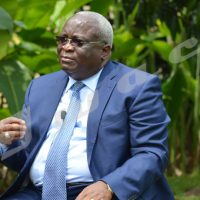
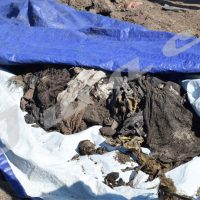
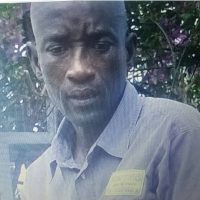
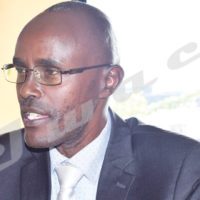
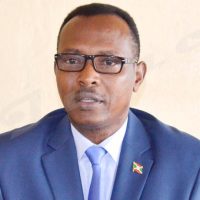













 IWACU Open Data
IWACU Open Data

